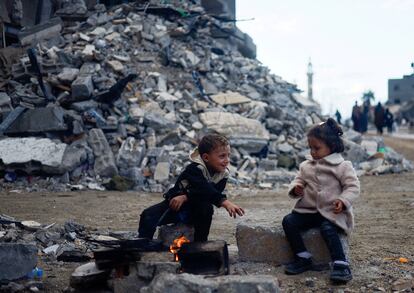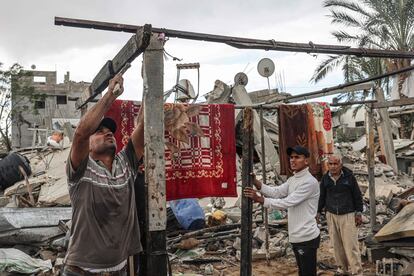Relief and hope after extension of Gaza ceasefire, pending new exchanges between Israel and Hamas
Inhabitants of the Strip want the temporary truce to become definitive while the families of Israeli hostages have called for ‘the return of all of them, immediately, whatever it takes’

The two-day extension of the truce in Gaza has been received with a mixture of relief and hope by Israelis and Palestinians. The former, because it will mean the release of at least another 20 women and children held hostage by militias in the Strip; the latter, because a further 60 Palestinian prisoners will be released to East Jerusalem and the West Bank and, above all, because it provides a little breathing space for the devastated enclave, whose inhabitants live in hope that each day without bombardment and each truck carrying humanitarian aid will not be the last.
“This afternoon’s news brings a sigh of relief to our community. However, we remain deeply concerned for our loved ones still held hostage,” said Osnat Peri, leader of Nir Oz, the Israeli kibbutz where the 11 hostages released Monday are from. Another 49 residents of Nir Oz remain captive in Gaza. “We call for the return of all of them, immediately, whatever it takes,” he added.
The Argentine-Israeli Bibas family issued a statement expressing their “profound uncertainty” after learning that married couple Yarden and Shiri and their sons, Ariel, 4, and Kfir, who is 10 months old, would not be released Monday. The Israeli army has confirmed the family is not being held by Hamas, but by another unidentified Palestinian faction. “The agreement has given us hope, but no matter how much hope there is I won’t say they are in our hands until I see them in front of me with my own eyes,” Yair Keshet, Yarden’s uncle, told this newspaper in Tel Aviv on Friday.
In Gaza, the population is waiting resignedly for the temporary ceasefire to become definitive. The primary mediators of the pact, Qatar and Egypt, are working toward this objective but Israel vehemently rejects the idea. The country’s defense minister, Yoav Gallant, warned Thursday that the pause in hostilities will be “short” and the army will resume its offensive throughout Gaza “with intensity.”

In search of food and water
Palestinians are taking advantage of the absence of fighter-bombers and drones to take to the streets to look for food, which is scarce and expensive, and to stand in line to fill jerry cans with drinking water and obtain butane gas bottles. Residents of Gaza have also been withdrawing money from banks, knowing that the respite will not last more than a few days. The Hamas government’s Ministry of Health also reported that the dialysis department at Al Shifa Hospital in Gaza City is back in operation, after the withdrawal of the Israeli troops that occupied the medical facility.
“Yes, the shelling has stopped, but we need a truce that allows us to return to our homes. Otherwise, there is no point. I would rather go back to my home and die there than be in a tent living in shame and forced to depend on other people for basic necessities,” Ayman Harb, a father of three who took advantage of the cessation of hostilities to cross south of the line where Israel has forced hundreds of thousands of people to evacuate, told Al Jazeera.
For the moment, Hamas has only extended the truce for 48 hours because it can only commit to handing over 20 women and children, as it has to locate the rest, the militia told Qatari mediators. One of the leaders of Hamas’ armed wing, Jalil Al Hayya, said late in the day that, after the two additional days, a new agreement must be negotiated that also includes adult males.
This case would apply to Yonatan Samrano, who was kidnapped at the Nova festival. His mother, Ayelet, on Monday made a plea on national public television for an end to the “hierarchization” of hostages. “We have the obligation not only to receive what they give us, but to ask. To dictate the list ourselves,” she said. Itai Regev, 18, whose sister Maya was released Sunday, would also fall within the framework of such a pact. “It’s very hard for Maya to be here and for Itai to be in Gaza. It’s a rollercoaster of emotions that is hard to describe,” said his mother, Mirit.

Hamas leader visits hostages
Although information about the health of the released Israeli hostages is being tightly controlled, details have been emerging about the conditions of their captivity in Gaza, mainly from family members’ posts on social networks or through local media reports. Images reveal that they are in apparent good physical condition, except for an 84-year-old woman who was held hostage for 50 days without access to medication for the chronic illnesses she suffers from, and who was hospitalized in a serious condition. The hostages were not beaten or tortured and received medication intermittently. Surprisingly, Yahya Sinwar, the political leader of Hamas in Gaza and Israel’s most wanted man, visited some of the hostages and tried to reassure them in Hebrew, a language he learned in prison and speaks fluently: “Hello, I am Yahya Sinwar. You can’t be safer here. Nothing will happen to you,” he told them.
All the hostages lost weight because they were receiving little food — usually rice, hummus, pita bread and water — in line with the situation most Gazans are in. Some picked up skin diseases, apparently as a result of being held underground. Itai Pesach, manager of the Safra Children’s Hospital near Tel Aviv, said that the children among the released hostages are being returned home after receiving basic medical care and that psychologists are not asking them questions about what happened.
Those who were held in deeper underground locations slept on plastic benches and sometimes had to wait between one and two hours before they could go to the toilet. Some were divided according to the locality in which they were captured. Others were allowed access to radio news in Hebrew. This is how one woman discovered that her son had been killed on October 7. Others only learned that they had lost loved ones that day once they had been returned to Israel.
Sign up for our weekly newsletter to get more English-language news coverage from EL PAÍS USA Edition
Tu suscripción se está usando en otro dispositivo
¿Quieres añadir otro usuario a tu suscripción?
Si continúas leyendo en este dispositivo, no se podrá leer en el otro.
FlechaTu suscripción se está usando en otro dispositivo y solo puedes acceder a EL PAÍS desde un dispositivo a la vez.
Si quieres compartir tu cuenta, cambia tu suscripción a la modalidad Premium, así podrás añadir otro usuario. Cada uno accederá con su propia cuenta de email, lo que os permitirá personalizar vuestra experiencia en EL PAÍS.
¿Tienes una suscripción de empresa? Accede aquí para contratar más cuentas.
En el caso de no saber quién está usando tu cuenta, te recomendamos cambiar tu contraseña aquí.
Si decides continuar compartiendo tu cuenta, este mensaje se mostrará en tu dispositivo y en el de la otra persona que está usando tu cuenta de forma indefinida, afectando a tu experiencia de lectura. Puedes consultar aquí los términos y condiciones de la suscripción digital.









































